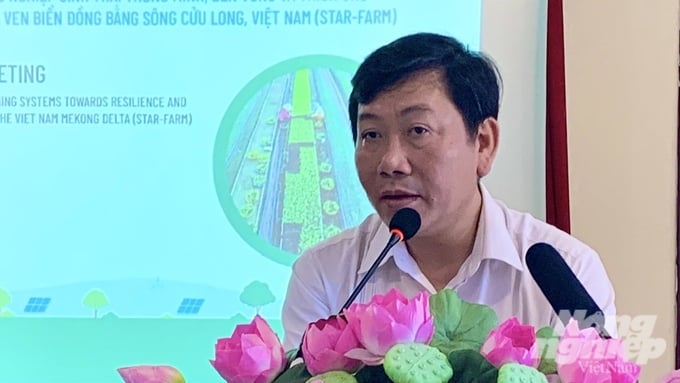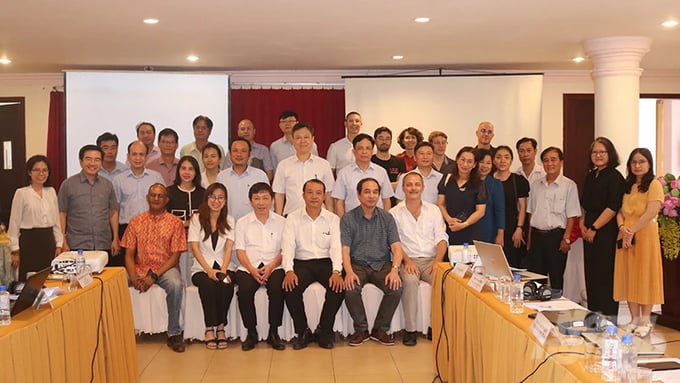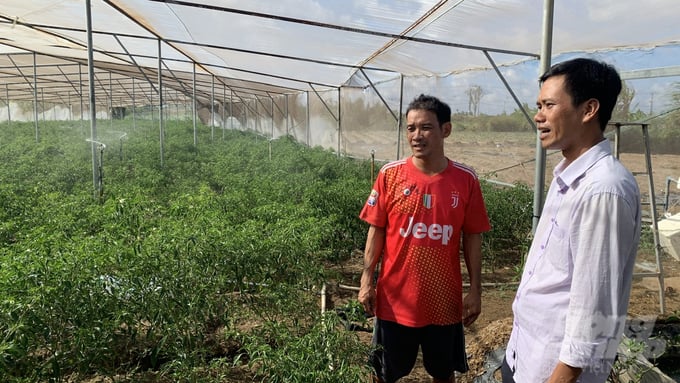June 14, 2025 | 23:24 GMT +7
June 14, 2025 | 23:24 GMT +7
Hotline: 0913.378.918
June 14, 2025 | 23:24 GMT +7
Hotline: 0913.378.918

Mr. Nguyen Do Anh Tuan, Director of the International Cooperation Department at the Ministry of Agriculture and Rural Development, requested stakeholders to collaborate in building agricultural production models that characterize the middle and coastal zones of the Mekong Delta. Photo: HT.
The Ministry of Agriculture and Rural Development, in collaboration with the Tra Vinh Provincial People's Committee, organized a workshop on April 25 titled "Technical Consultation and Implementation of the Project for Smart Agro-ecological Transformation of Farming Systems towards Resilience and Sustainability in Middle and Coastal Zones of the Vietnam Mekong Delta" (STAR-FARM project).
The project is funded by the European Union through the United Nation's Food and Agriculture Organization (FAO). The project will be implemented in the provinces of Dong Thap, Kien Giang, and Tra Vinh from 2023 to 2027, with a total funding of 4.2 million euros.
During the workshop, the Project Management Board of STAR-FARM received input from representatives from domestic and international institutions, universities, organizations, and delegates from the Departments of Agriculture and Rural Development of Tra Vinh, Dong Thap, and Kien Giang. Accordingly, participants of the workshop presented insights into the challenges and difficulties posed by climate change and rising sea levels in agricultural production.
According to FAO, agricultural activities in the Mekong Delta region are currently facing considerable challenges due to climate change. In order to overcome these challenges, farmers in the region must adjust their farming habits and production methods. Additionally, the project management board aims to identify the most suitable project site based on several specific criteria.
Mr. Le Truong Son, Director of the Tra Vinh province's Sub-Department of Crop Production and Plant Protection, reported that the province's agricultural production scale is currently limited and fragmented. Additionally, he emphasized the uneven quality of production and the challenge of meeting large-scale demands when necessary.
On the other hand, the transfer of scientific and technological knowledge to local farmers lacks breakthroughs to increase productivity and product quality. Additionally, the significance of value chain linkages has not been widely disseminated within the province. Unsustainable farming practices and habits pose an adverse effect on the local environment. Notably, farmers' excessive use of chemical inputs such as chemical fertilizers and pesticides, alongside saltwater intrusion, has caused significant damage to the province's agricultural production.
Mr. Son proposed the project to support the province in building agricultural value chains for rice and peanuts; and promoting the production of beef, giant tiger prawn, whiteleg shrimp, and crab.
Similarly, Mr. Tran Thanh Tam, Director of the Dong Thap province's Sub-Department of Crop Production and Plant Protection, proposed the project to support local governments in developing innovative solutions for ecological agriculture, and implementing eco-agricultural models.
Other project activities include: increasing youth and women's participation in the project; disseminating sustainable production standards and eco-agricultural approaches; and building sustainable business plans for project participants.

The workshop was attended by various domestic and international institutions, universities, and organizations. Photo: HT.
According to the Project Management Board of STAR-FARM, the selection of the project site is conducted based on several criteria, including: the unique characteristics of the middle and coastal zones of the Mekong Delta, the diversity of agricultural systems, and vulnerability to climate change. Moreover, factors such as the involvement of ethnic minorities, the development of value chains, ongoing related projects, the participation of private organizations, as well as natural reserves and mangrove forests will also be considered during the selection process.
As part of the project's initiatives to support the development of eco-agriculture in the Mekong Delta region, experts and representatives from collaborating organizations will coordinate with local governments to conduct field surveys. The objective is to select 10 locations across the provinces of Tra Vinh, Dong Thap, and Kien Giang for the implementation of project activities.
At least 24 farmer groups and cooperatives will receive support to enhance their capacities in management, production, trading, and market access. Assistance will also be provided for the establishment of cooperatives for youth, women, and ethnic minorities. Fifteen small and medium-sized agricultural businesses will be assisted in gaining access to green financing sources. Three support packages will be developed to foster innovative agricultural projects and eco-agricultural models. Furthermore, three models will be constructed for key eco-agricultural products, alongside support for 8 startup models associated with sustainable value chains.
Mr. Nguyen Do Anh Tuan, Director of the International Cooperation Department at the Ministry of Agriculture and Rural Development, emphasized the need to collaborate in building agricultural production models that characterize the middle and coastal zones of the Mekong Delta. There are also plans to promote and replicate models that adapt to climate conditions and weather patterns, integrate seamlessly with production practices, and foster sustainable livelihoods for residents in the Mekong Delta region.

According to a representative from the Project Management Board of STAR-FARM, the selection of project site is conducted based on specific criteria. Photo: Ho Thao.
The project prioritizes research on converting sustainable food systems; promoting ecological transformation in agricultural production, livestock production, animal health, crops; minimizing environmental degradation; and safeguarding public health.
On April 26, the Project Management Board of STAR-FARM visited exemplary smart, sustainable and climate change resilience eco-agricultural models in Tra Vinh province.
Translated by Nguyen Hai Long
![Turning wind and rain into action: [4] Bringing climate bulletins to remote and isolated areas](https://t.ex-cdn.com/nongnghiepmoitruong.vn/608w/files/linhnhp/2025/06/14/1152-z6704423696987_15fd32ffc26d590d204d520c9dac6786-nongnghiep-151141.jpg)
(VAN) The Vietnam Agriculture and Nature Newspaper interviewed Mr. Vu Thai Truong, Acting Head of Climate Change and Environment at UNDP Vietnam, to gain deeper insight into how climate bulletins are delivered to farmers.

(VAN) In Tien Giang, a high-tech shrimp farm has developed a distinctive energy-saving farming model that has yielded promising results.
![Turning wind and rain into action: [3] 300.000 farmers benefit from agro-climatic bulletins](https://t.ex-cdn.com/nongnghiepmoitruong.vn/608w/files/news/2025/06/12/e5a48259d6a262fc3bb3-nongnghiep-125122.jpg)
(VAN) The agro-climatic bulletin has become a valuable tool for farmers in the Mekong Delta. After more than five years of implementation, the initiative is gradually being expanded nationwide.
![Turning wind and rain into action: [2] Providing forecasts to the people](https://t.ex-cdn.com/nongnghiepmoitruong.vn/608w/files/news/2025/06/12/e5a48259d6a262fc3bb3-nongnghiep-103927.jpg)
(VAN) In addition to improving the quality of hydrometeorological forecasts, putting forecast bulletins into practical use is crucial for production and disaster prevention.

(VAN) Blue carbon is receiving attention for its rapid absorption capacity and vast potential. It represents a promising nature-based solution to respond to climate change.
/2025/06/11/3507-1-161904_583.jpg)
(VAN) Seagrass beds and coral reefs serve as 'cradles' that nurture life in the ocean depths, creating rich aquatic resources in Vietnamese waters.
![Turning wind and rain into action: [1] Forecasting for farmers](https://t.ex-cdn.com/nongnghiepmoitruong.vn/608w/files/news/2025/06/11/e5a48259d6a262fc3bb3-nongnghiep-111919.jpg)
(VAN) Weather is no longer just a matter of fate. Forecasts have now become an essential companion for farmers in every crop season.